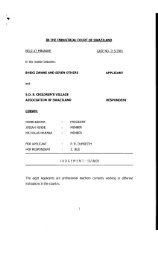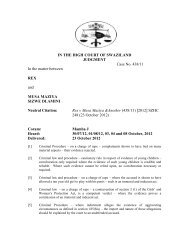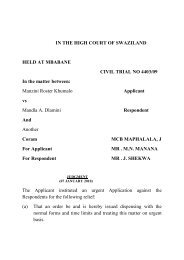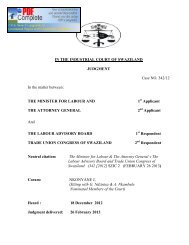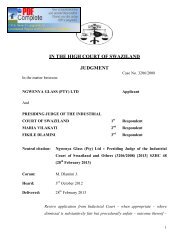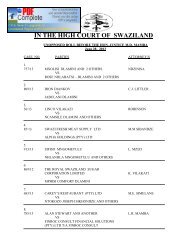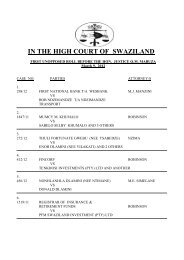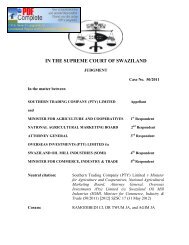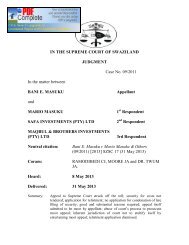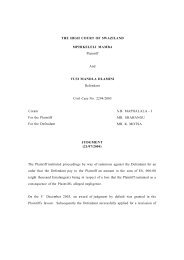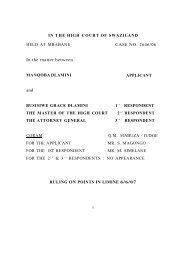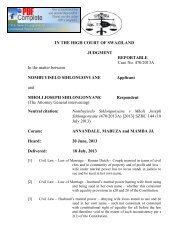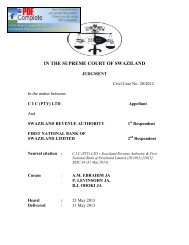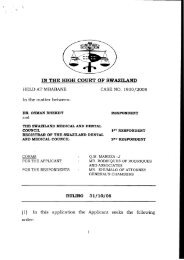IN THE HIGH COURT OF S\V AZIL.\i'W S\V AZILAND ... - SwaziLII
IN THE HIGH COURT OF S\V AZIL.\i'W S\V AZILAND ... - SwaziLII
IN THE HIGH COURT OF S\V AZIL.\i'W S\V AZILAND ... - SwaziLII
You also want an ePaper? Increase the reach of your titles
YUMPU automatically turns print PDFs into web optimized ePapers that Google loves.
<strong>IN</strong> <strong>THE</strong> <strong>HIGH</strong> <strong>COURT</strong> <strong>OF</strong> <strong>S\V</strong> <strong>AZIL</strong>.<strong>\i'W</strong>Civil Case No. 1668/2007<strong>S\V</strong> <strong>AZIL</strong>AND COlVIMERCIAL At"IADODAROAD TRAt"lSPORTATION ASSOCIATIONApplicantAnd<strong>THE</strong> M<strong>IN</strong>ISTER <strong>OF</strong> NATURAL RESOURCES<strong>THE</strong> PRICE CONTROLLER<strong>THE</strong> A TIORNEY GENERALOIL <strong>IN</strong>DUSTRYSW <strong>AZIL</strong>AND PETROL RETAILERSASSOCIATIONlSI: Respondent2:ld Respondent3 rd Respondent4th R~1JOndentjib R~-pondentCoramF or the ApplicantFor the RespondentS.B. :\fAPHALALA-JMR. ~. FAKLUZEMR KL:"B'"E - CrownCounsel 3SSh-red byMR \ lL.AK ..-\ TI - CrownCounsel in the A~..orr.:eyGenernl's Chambers
2JUDGMENT25 th May 2007[1] This is an application brought under a Certificate of Urgency for aninterim interdict declaring the ~laximum \Vholesale and Retail Prices ofPetroleum Products Notice, Tuesday 8 th lVlay 2007 made pursuant to thePrice Control Order 2511973 null and void and wlconstirutional and againstthe public interest.[2] Ordering and directing the 1 st and 2 nd Respondents to issue a new. Notice in strict conformity and adherence to the Price Control Order 25 of1973 and the Constitution Act that such new Notice should only come intoforce after a period of 14 (fourteen) days or such other period equivalent tothe number of days and that the Notice would have been in force.[3] That pending the issuance of such Notice the status quo ante prior 10the 8 th May 2007 prevails.[4] The application is founded on the affida"it of its Secretary-Generzlone Duma Msibi who has averred therein that he has been duly authorized Ii)institute the present proceedings by virtue of a resolution of the Applicar:~attached herein and marked "51".[5] The Respondents oppose the granting of the above-cited orders andhave filed a Notice of Intention to Oppose accompanied by a ~otice to Ra.i5!
3. Points of Law that should be sufficient to unseat the Applicant on thefollowing grounds:1. Locus standi - The Applicant lacks sufficient facts to show thatthe Applicant has locus standi. An association~ whethercorporate or incorporate, derives locus srandi from itsconstitution. The Applicant ought to have attached itsconstitution to the Founding affidavit. The failure to do so isfatal to the Applicant's case.2. The Applicant is bringing a representative application on behalfof its members. It is incompetent for an association to sue onbehalf of its members where the members can sue in theirindividual capacities as members of that association.[6] In arguments before court Counsel for the Respondents cited twocases in support of the first point of law raised being the South African caseof Bantu Callies Football Club vs Motlhamme and others 1978 (4) S_.1.. 486(T) and the local decision in the matter of Lawyers for Human Righrs (SJJtD,and another vs Attorney General and Another- Civil Case Ao. //12212001.[7] On the second point of law the RespondentS direc-...eJ the co un ~ ~attention to two South African decisions in L~emaner o{ Ahmadi)yc.Anyuman Ishaati - Islam Lahore (South Africa; and A17IJ::h~r vs Jfuslirr.Judicial Council (Cape) and Others 1983 (4) S.A. 855 (C) a: 864 B - Fanethat of Congress of Traditional Leaders OfSOlllh Africa vs J.lirJi.ner of LocaJGovernment, Eastern Cape and Others /996 (2) S_-L 898 (TK5, at 905G-
4. [8] On the other hand the Applicant oppose the above-cited points of lawand in argument before me Counsel for the Applicant contended that in thecase of Bantu Callies Football Club (supra) it was not stated as arequirement that an association must file its constitution.[9] Counsel for the Applicant further cited the South African case ofTattersall and another vs Nedcor Bank Ltd 1995 (3) S.A. 222 A where it wasstated that when challenge to authority the '"'\\'eak minimum evidencesufficient rule" is applied and that authority can be proved by aliundeevidence. The court was further referred to the case of .l\-ferlin Gerine (PO)Ltd vs All Current and Drive Centre (Pty) Ltd aOO another 1994 (1) S.A. 659(c) where Conradie J stated the following:"Moving for dismissal is not itself a right but a remedy for the right not to be un.falrlyproceeded against ... wbere, however, as in the prese::nt case the resolution of ireApplicant's board has only to be submitted to be aa:qxed. there is really very little i:amin allowing an Applicant to put Ills papers in order ......,[10] It was contended further for the Applicant that It is legally competentand capable to sue in its capacity and it would be unprecedented that itsmembers should bring the application in their inw\;dual capacities.[11] In this judgment I shall proceed to determine the points of law rai.s....-"'dad seriatim, thusly;(i)Locus standi.
5. [12] The argument for the Respondent in this regard is that the Applicantought to have attached its constitution to the Founding affidavit. The failureto do so is fatal to the Applicanfs case.[13] In this regard the Respondents rely on what was held in the SouthAfrican case of Bantu Callies Football Club (supra) and the local decisionin Lawyers for Human Rights (supra). In order to fully understand theargument I shall sketch briefly the findings in these two cases as follows:[14] In Bantu Callies Football Club (supra) King J stated as follows:"The rights and powers of a voluntary association are limited by 1he tenns of its charteron constitution. The constitution defines whether an associarico Is or not a universitasand confmes its activities to what is expressly or impliedly contamerl therein"[1 S] Masuku J in the case Lawyers For Human Rights (supra) adoptedwhat was said in the case of Moletlegi and Another vs President ofBophuthatSlvana and another 1989 (3) S.A. 119 B that ha,,;ng consideredrelevant provisions of the respective constitutions of the Applicant he cameto the view that both Applicants did not qualify !o be regarded asuniversitas.[16] In Ahmandiya Anyuman Ishaati (supra), it was beki inter alia that ifthe constitution of an association makes it clear that such a:;sociation has thecharacteristic of a univerutas, this would be decisive of ithe issue it can suein its own name. It would only be in those instances where the constitutionis not clear that one could have regard to the activities 'Of an association inorder to detennine whether those activities are such -5 to constitute the
6. association a un'iversitas. The facts of this case are clearly stated in thehead-note as follows:The first Plaintiff described itself as "a voluntary association of :\fuslims" constituted interms of a written constitution. Its members were said to be commonly referred to as·'Ahmadis". It alleged that the fIrst Defendant (a yolunrary association of sheiks. imamsand theologians) had wrongfully and maliciously propagated to Muslims in Scuth Africadefamatory mater concerning its members, to wit, that all Ahmadis were non-Muslims,were apostates from Islam. were non-believers, that they rejected the finality of theprophethood of Muhammed and that they were therefore [0 be denied admittance to allmosques, denied the right to bury their dead in any Muslim cemetery and that all businessand social intercourse with Ahmadis should be prohibited The first Plaintiff, togetherVvith the second Plaintiff (who joined the action as a member of the first Plaintiff and inhis indi~idual capacity), claimed (a) as against all the Defendants, an order declaring that. the members of the fIrst Plaintiff were Muslims and as such were entided to all suchrights and priviledges as pertain to Muslims, (b) as against the first Defendant, an orderinterdicting it from propagating false and defamatory matter concerning the members ofthe first Plaintiff, (c) as against the second Defendant (the trusrees of a particularmosque), an order declaring that the first Plaintiff's members were c:ntitfed to admittanceto the mosque, and (d) as against the third Defendant (the trustees of a Muslim cemetery),an order declaring that the members of the first Plaintiff had the same rigbIs of burial inthe cemetery as pertained to all Muslims. The Defendants excepted 10 me firn Plaintiff'sparticulars of claim on the grounds that it had no locus standito bring :iUCh claims.Tbey argued their exception on two bases. Firsdy. they argued that the ~ Pl'.aimiffhadnot alleged that it as such bad suffered the wrongs v .. bich were the foundation of itsaction, but that such wrongs bad been suffered by its Members. fu fu'Sl Pbintiff thussought relief on behalf of its members, which it bad iOC'.l£ sr.andi to Co ,00 m.e b::half inthat it bad no direct interest in the proceedings or the relief sought ;::cd :.ad 00 PJwer tobring a representative action on behalf of its members or to prote:.:1 U!I" 53i"tgmrd theinterests of its members in relation to the dispute. Secondly. they ll"pe:d dint me tim:Plaintiff had no locus standi to institute that part of the aaction '!hat ~ :0 i.ef.unat:iooin that it, as an association, was not capable of being defuned On a ~ ~tariooof the particulars of claim it was bringing a represclIwive acriu:n {Ill G:rc1aEf of in
7members which it was not competent or able to bring. The first Plaintiff argued that the.exception was incompetent because, apart from an examination of its constitution,evidence would be necessary as to the activities of the associaIiOIl before the court coulddecide whether it was a universitas or not.[17] Counsel for the Applicant further referred to the South African case ofCongress of Traditional Leaders of South Africa (supra) where theApplicant's essential complaint was that the application of the TransitionAct to rural areas in the Eastern Cape deprived traditional leaders of theirpowers In terms of various legislation which was not specified by theApplicant, which powers were in some sense entrenched in substantiveprovisions of the Constitution Act.[18] The Respondents raised certain points in limine. amongst others thaton the papers deponent to the Founding affidavit had no authority on behalfto institute the application or to depose to the affida\li~ and that Contralesahad no locus standi to bring the application in that it did not have a directand substantial interest in the subject' matter of the litigatio~ and that thecourt had no jurisdiction to enquire into the ,-alidilY of certain of thelegislation attacked by the Applicant. The Applicant conceded the latterpoint. It was held, inter alia, with regard to the question of whether or notthe Applicant had locus standi, that the law as it s-tOCd at present did notpermit the bringing of representative or class th.-tons saye in thosecircumstances now specified in Section 7 of the Cons:irurion Ace I mus~mention that in this case the court referred to amon~ other cases that ofAhmadiya (South Africa) (supra).
8[19] After considering all the cases cited in this dispute I am inclined tofollow what was suggested by Counsel for the Applicant in line with whatwas decided in the South African case of Tattersall and Another (supra)where it was stated that when challenge to authority the ·'weak minimumevidence sufficient rule" is applied and that authority can be proved byaliunde evidence. The reason I have adopted this approach is that thepresent matter is very important to many people in this country and I am ofthe considered view that it would be folly for this court to dismiss such acase on mere technical objections and leave the gravamen of the caseundecided. I do appreciate that the South African cases may have dealt withissues in the realm of company law but I am of the considered view that thel~gal principles propounded in those decisions can find application in casessimilar to the one before court.(ii)A representative application.[20] Coming to the second point in limine that the Applicant is bringing arepresentative application on behalf of its members. Again in this regard inview of the facts of the matter I am inclined to agree v.ith the ApplicantThe Applicant is legally competent and capable to sue in its capacityrepresenting its members and I agree with the Applicant's Counsel that itwould be unprecedented that its members should bring the application intheir individual capacities. Here we have hundreds of thousands affectedpeople around the country.[21] In the result, for the afore-going reasons I woold dismiss the points oflaw raised by the Respondents and further state tbat costs reserved to the
9. main application. Further Respondents to file their opposing affidavits andApplicant granted leave to file its constitution as aliunde evidence as statedin the Tattersall case (supra).S.B. MAPHALALAJUDGE



